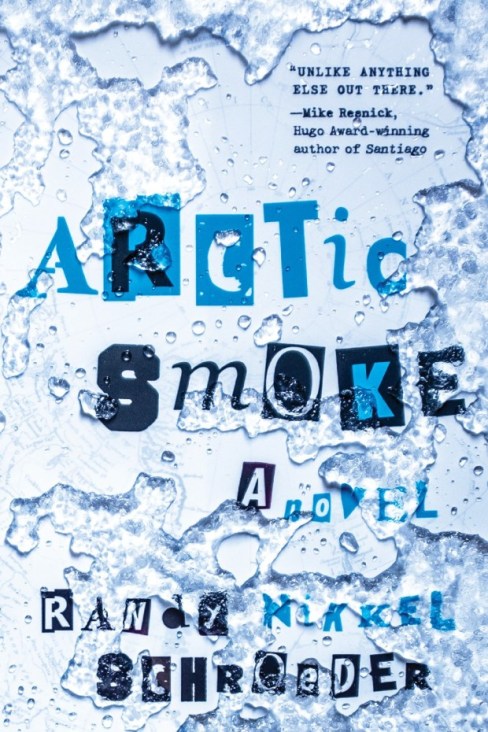 by Mike Thorn
by Mike Thorn
Arctic Smoke: A Novel
by Randy Nikkel Schroeder
NeWest Press (2019)
ISBN 978-1-988732-70-1
Randy Nikkel Schroeder’s Arctic Smoke does not simply inhabit its multiple genres, but instead interrogates the intersections and tensions between those genres’ methodologies. That is, while advancing its own double-pronged investigation/voyage plot, the novel simultaneously destabilizes the very foundations of that which constitutes story. Deftly side-stepping the trap of tired postmodern exercise, the book instead hybridizes content and form to deliver an absorbing reading experience: while it sometimes threatens to dissolve into total abstraction, it always conducts its deconstruction within meticulous narratological architecture. In other words, Arctic Smoke is about a lot more than plot, but it is also all about plot. If it hurts your brain trying to imagine what this paradox looks like in written practice, I recommend you pick up this book and get lost in its ingenious absurdity.
Arctic Smoke depicts two sets of characters undergoing journeys toward ambiguous consequences. The primary plot follows aging punk Lor Kowalski and his newly reunited bandmates as they venture north to participate in a mysterious Arctic festival tour. The secondary plot focuses on two rogue CSIS agents, Seri and Rooke, who are intent on snuffing out the very kinds of cultural “subversives” typified by Lor and his renegade band. As these two sets of characters move closer and closer toward confrontation, the very nature of “subversion” and “counter-culture” dissolves within spaces where such signifiers begin to lose meaning.
Put simply, this novel is a joy to read. While exhibiting fascinating ideas about the relationship between plot content and narrative form, it also showcases some of the most hypnotizing prose style this reviewer has encountered in any work of fiction from the past several years. While investigating theoretical concepts through his narrative framework, Schroeder dives headlong into the qualities that make fiction so uniquely pleasurable. Arctic Smoke is written in sentences that are hyper-lucid and insanely vivid at the same time. Schroeder has a deep understanding of his people and environments, which he conveys through gorgeously detailed imagery, note-perfect dialogue, and dramatic episodes that often ride tension to its breaking point. In terms of craft, this is top-tier fiction.
Also worth commending is the novel’s distinctiveness and originality. It is impressive to observe the ways in which Schroeder combines seemingly dissonant influences to find singular shape and rhythm. He lifts from the affective and rhythmic qualities of music (especially punk, but also rock and roll more broadly), while also applying Pynchonian ideas to the mystic territory one might associate with such titans of the fantasy genre as C. S. Lewis and J. R. R. Tolkien. Schroeder mines from all these sources the shared tenets of narrative movement, whether he is exploring sonic structure or the persistent elements that emerge in works of fiction across genres. As a work of plot-driven, genre-crossing irrealism, Arctic Smoke emerges through its author’s ambitious formal conceits as a fully formed and engaging read. This is a staggering achievement.
Mike Thorn is the author of the short story collection Darkest Hours. His fiction has appeared in numerous magazines, anthologies, and podcasts, including Dark Moon Digest, The NoSleep Podcast, Tales to Terrify, and Straylight Literary Arts Magazine. Visit him online at mikethornwrites.com.


1 Comment